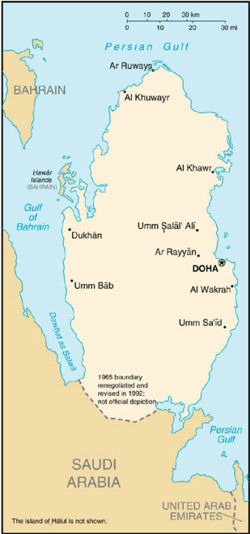Qatar: Difference between revisions
imported>Martin Baldwin-Edwards No edit summary |
imported>Hayford Peirce (replaced hyphens with CZ conventioned emdashes) |
||
| Line 1: | Line 1: | ||
'''Qatar''' {{Image|Qatar cia.jpg|right|250px|CIA World Factbook}}is a small oil-rich country, occupying the Qatar peninsular on the north-eastern coast of the Arabian peninsular. It has the smallest indigenous population among the six [[Gulf Co-operation Council]] | '''Qatar''' {{Image|Qatar cia.jpg|right|250px|CIA World Factbook}}is a small oil-rich country, occupying the Qatar peninsular on the north-eastern coast of the Arabian peninsular. It has the smallest indigenous population among the six [[Gulf Co-operation Council]] countries—at an estimated 220,000 in 2010—and the second smallest landmass (after the nearby island of [[Bahrain]]) at 11,437 km². It is one of the world's richest countries per capita, by virtue of its large oil and gas reserves. Qatar has been ruled by the al-Thani tribe since 1868, when the British recognised Qatar as distinct from Bahrain; it achieved independence from British colonial rule in April 1970. The current emir is Hamad ibn Khalifah ibn Hamnad al-Thani, who ousted his father in a non-violent coup on June 27, 1995. In recent years, Qatar has distinguished itself with the state-financed Al-Jazeera TV network—broadcasting in Arabic since 1996 and in English since 2006—and its selection in 2010 as host of the 2022 FIFA World Cup. | ||
Revision as of 16:22, 13 March 2011
Qatar
is a small oil-rich country, occupying the Qatar peninsular on the north-eastern coast of the Arabian peninsular. It has the smallest indigenous population among the six Gulf Co-operation Council countries—at an estimated 220,000 in 2010—and the second smallest landmass (after the nearby island of Bahrain) at 11,437 km². It is one of the world's richest countries per capita, by virtue of its large oil and gas reserves. Qatar has been ruled by the al-Thani tribe since 1868, when the British recognised Qatar as distinct from Bahrain; it achieved independence from British colonial rule in April 1970. The current emir is Hamad ibn Khalifah ibn Hamnad al-Thani, who ousted his father in a non-violent coup on June 27, 1995. In recent years, Qatar has distinguished itself with the state-financed Al-Jazeera TV network—broadcasting in Arabic since 1996 and in English since 2006—and its selection in 2010 as host of the 2022 FIFA World Cup.
